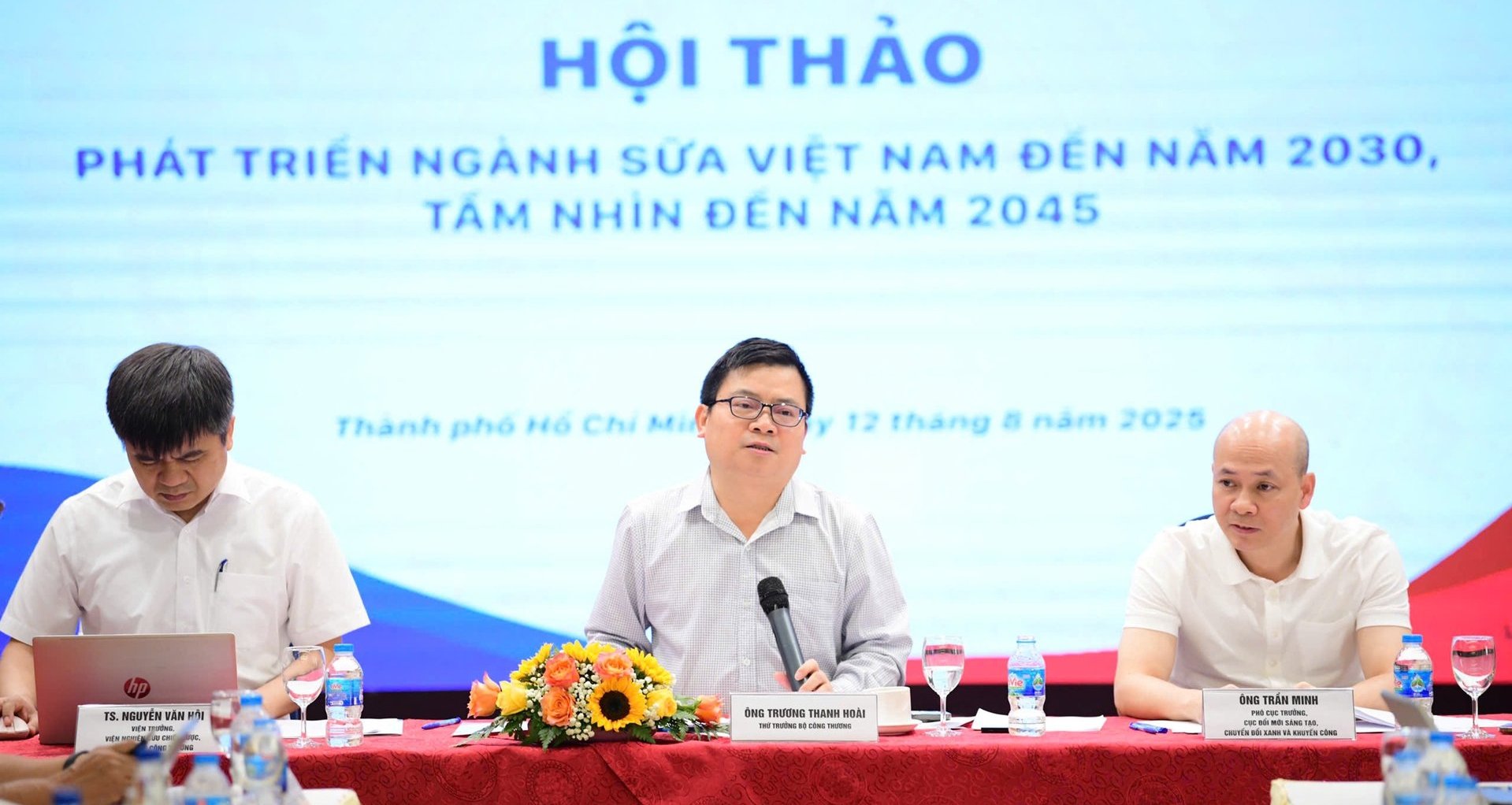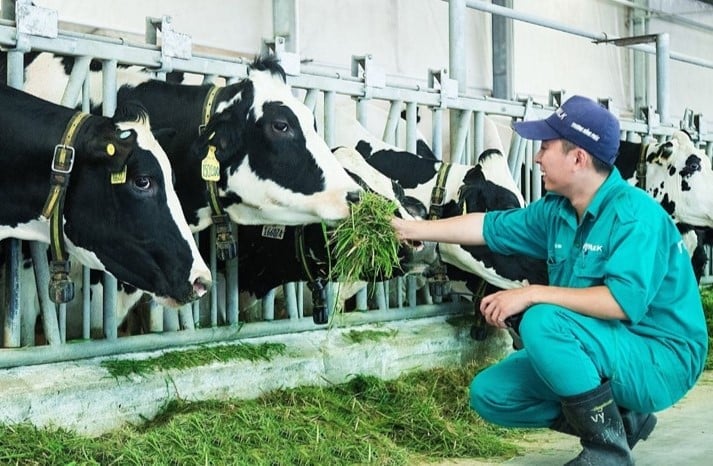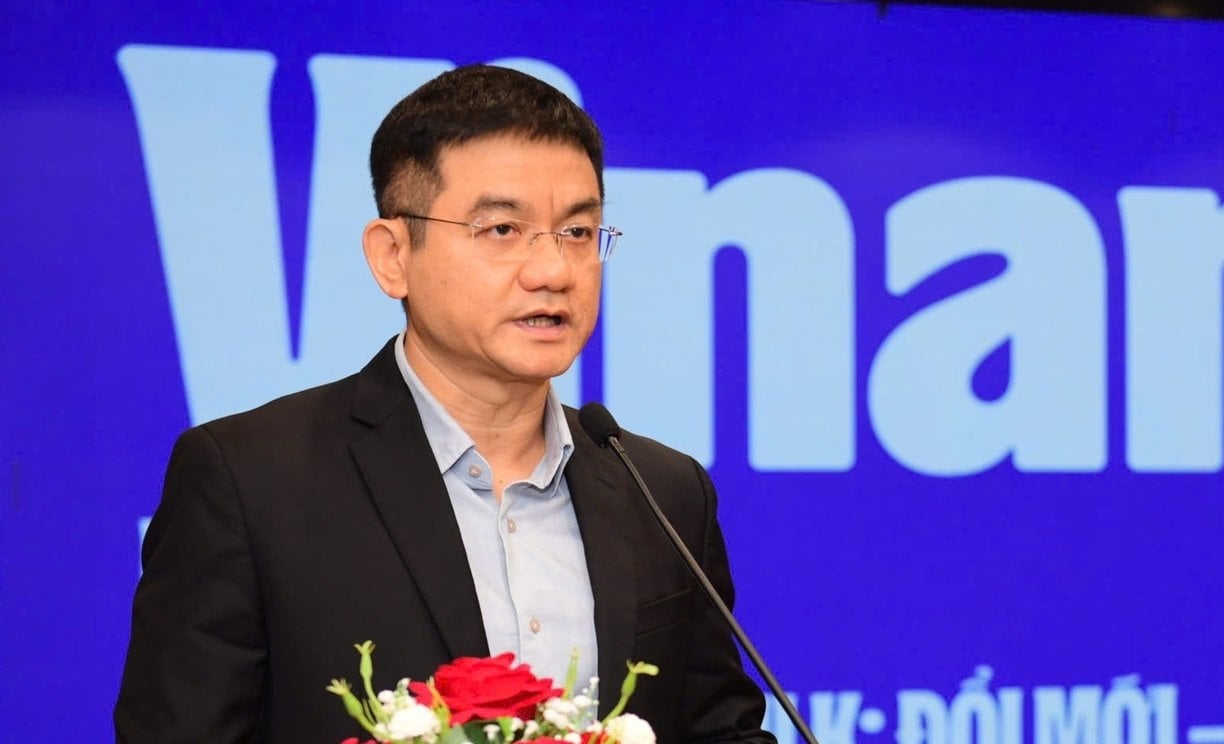December 5, 2025 | 18:19 GMT +7
December 5, 2025 | 18:19 GMT +7
Hotline: 0913.378.918
December 5, 2025 | 18:19 GMT +7
Hotline: 0913.378.918
This issue was raised by Mr. Truong Thanh Hoai, Deputy Minister of Industry and Trade, at the seminar "Development strategy for Vietnam’s dairy industry in the period to 2030, vision to 2045," held in Ho Chi Minh City on August 12. According to Mr. Hoai, the dairy industry is a crucial link in ensuring community nutrition, contributing to improving the stature, physical strength, and intellect of Vietnamese people, while also serving as a strategic sector of agriculture in the goal of sustainable development.

Deputy Minister of Industry and Trade Truong Thanh Hoai (center) and delegates discuss the development direction of Vietnam’s dairy industry until 2030, with a vision toward 2045. Photo: Ha Duyen.
According to Mr. Hoai, deep integration, along with increasingly strict requirements for quality and food safety, presents breakthrough opportunities and intense competitive pressure for the dairy industry. This demands a synchronized, well-structured, and long-term development strategy that leverages domestic advantages and enhances adaptability to fluctuations in the international market.
To achieve the goals set for 2030 and the vision for 2045, Mr. Hoai believes the dairy industry needs to simultaneously implement multiple pillars, including: developing sustainable raw material regions; investing in modern processing technology; upgrading the logistics system; expanding distribution channels; and improving mechanisms and policies to attract investment, encourage innovation, and promote value chain linkage.
Alongside this, extensive international cooperation, effective utilization of free trade agreements (FTAs), and tapping into the green and sustainable consumption trends will be important levers to elevate the position of Vietnam’s dairy industry.
According to Associate Professor Dr. Tran Quang Trung, Chairman of the Vietnam Dairy Association, the country currently has nearly 400,000 dairy cows across more than 1,700 farms. The average milk yield in 2023 reached 5.4 tons per cow per year, compared to an average yield of 3 tons in 2010, representing an average growth rate of 5.7% per year. Fresh milk production in 2024 is estimated to reach 1.23 million tons, a 6% increase over 2023, meeting about 40% of domestic demand. However, the average milk consumption is only 26–28 liters per person per year, lower than Thailand (35 liters), Singapore (45 liters), and Europe (80–100 liters).

Mr. Ngo Minh Hai, Chairman of the Board of Directors of TH Group, presents his views on developing the dairy industry toward sustainability, linked to protecting public health and enhancing the position of Vietnamese dairy products in the international market. Photo: Ha Duyen.
Mr. Tran Quang Trung stated that Vietnam’s dairy industry strategy to 2030 targets increasing the national herd to 650,000–700,000 cows, with fresh milk output reaching 2.6 million tons, 60% of which will come from high-tech farms meeting GlobalGAP standards and aiming for carbon neutrality. At the same time, the household farming model will be developed in parallel to ensure a stable supply of raw milk.
He recommended that Vietnam’s milk regulations and standards, which were issued nearly 15 years ago, be updated to align with technological advances and international benchmarks such as Codex. He also called for stronger public communication on the role of milk, the relaunch of the School Milk Program, planning for grasslands and feed crop areas, policies to encourage land consolidation, and support for both businesses and farmers to expand production and enhance competitiveness.
From the business perspective, Mr. Ngo Minh Hai, Chairman of TH Group, outlined the strategy for 2030–2045, aiming for annual growth of 18%, the complete replacement of reconstituted milk by 2030, and self-sufficiency in over 70% of fresh milk raw materials by 2035. He emphasized that the domestic dairy sector still depends heavily on imported milk powder, underscoring the need for policies to accelerate the development of fresh milk production in Vietnam - both to ensure self-reliance and quality control, and to create opportunities for farmers to partner with major enterprises.

Vietnam’s dairy industry strategy to 2030 targets increasing the national herd to 650,000–700,000 cows, with fresh milk output reaching 2.6 million tons.
Accordingly, Mr. Hai proposed applying a 0% VAT rate to domestically produced raw fresh milk. At the same time, the government should adopt price-support policies for investments in fixed assets, breeding stock, and loan interest rates. In parallel, he suggested encouraging land consolidation and converting underperforming agricultural and forestry farms to dairy farming, as well as supporting farmers to participate in high-tech production chains. In addition, he called for the early implementation of a nationwide School Meal Program based on the integrated nutrition-and-exercise model that has been successfully piloted.
Meanwhile, Mr. Nguyen Quang Tri, Executive Director of Marketing at Vinamilk, said that to promote the sustainable development of the dairy industry, the legal framework must be promptly completed while simplifying investment and product registration procedures to create more favorable conditions for enterprises. He also recommended that the government introduce preferential policies on taxation, credit, and land to encourage the expansion of milk raw material zones and increase the localization rate of supply sources.

Mr. Nguyen Quang Tri, Executive Director of Marketing at Vinamilk, shares proposals and solutions to enhance the competitiveness of Vietnam’s dairy industry in the context of deep international integration. Photo: Ha Duyen.
Mr. Tri also proposed strengthening trade promotion activities and removing technical barriers for dairy products, as well as supporting enterprises in research, technological innovation, and the training of high-quality human resources. Another key factor, he emphasized, is maintaining a regular and effective dialogue mechanism between regulatory bodies and the business community to promptly address obstacles and create a transparent, stable business environment.
The dairy industry’s development strategy sets the goal by 2030 of achieving an average annual growth rate of 12–14%, with processed liquid milk output reaching about 4.2 billion liters per year and domestic fresh milk output reaching about 3 billion liters per year, meeting 70–72% of the needs of the domestic dairy processing sector. Per capita milk and dairy product consumption is targeted to reach 40 liters per year.
Looking ahead to 2045, the industry aims for an average annual growth rate of 5–6%, with processed liquid milk output reaching about 7.5 billion liters per year and domestic fresh milk output reaching about 6.2 billion liters per year, meeting 80–82% of processing needs, while increasing per capita consumption to around 70 liters per year.
Translated by Phuong Linh

(VAN) As of 2025, the ASEAN region has a total of 69 ASEAN Heritage Parks recognized across its 10 member states. Among them, Viet Nam contributes 15 ASEAN Heritage Parks.

(VAN) Yok Don National Park has high biodiversity with numerous endemic plant and animal species, and it is also the only dipterocarp forest ecosystem conservation area in Viet Nam.

(VAN) Viet Nam and Brunei signed two important MOUs on fisheries and IUU, expanding cooperation in agriculture, the environment, and Halal exports, aiming to substantively implement joint projects.

(VAN) The Viet Nam Coconut Association worked with the International Finance Corporation (IFC) and businesses to promote the supply chain, enhance competitiveness, and develop the coconut industry sustainably.
![Hue aims for Net Zero: [2] Pioneering low-emission tourism](https://t.ex-cdn.com/nongnghiepmoitruong.vn/608w/files/huytd/2025/12/04/0633-dulichzero-4-095634_236-161125.jpg)
(VAN) The ancient capital of Hue has developed Net Zero tourism products and models, aiming to reduce carbon emissions and pioneer the establishment of Viet Nam's green tourism destination.

(VAN) C.P. Viet Nam has announced the successful completion of its goal to plant 1.5 million trees during the 2021-2025 period, a key milestone within company's long-term ESG strategy and its roadmap for emission reduction.

(VAN) This is an initiative of MAE aimed at creating a unified coordination mechanism to implement agricultural cooperation programs with developing countries.